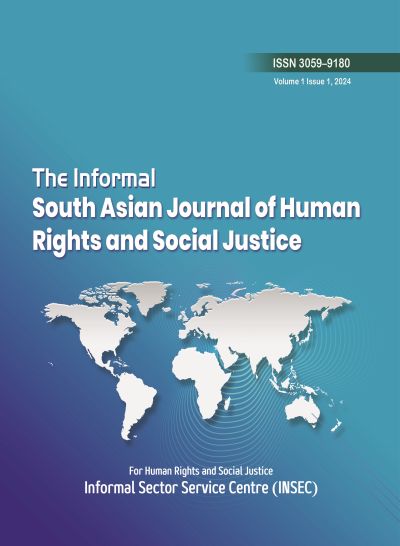Bhutan's Three-Pronged Strategy, Stifled Democracy and Human Rights Concerns
DOI:
https://doi.org/10.3126/informal.v1i1.69162Keywords:
interim government, De-Suung, royal annuity bills, social organizationsAbstract
The assessment of human rights and social justice in Bhutan reveals numerous challenges. Developmental disparities are stark, with significant resources directed towards the western districts, home to the ruling elites. This exacerbates the development lag in the southern, eastern, and central districts. Tourism mainly benefits the western areas, concentrating the majority of tourists there and leaving limited opportunities for other regions. Gender inequality persists, with women underrepresented in political and leadership positions. Girls continue to face harassment in public, molestation in schools, and violence at home, without targeted political interventions. Ethnic minorities, religious groups, and residents of remote regions remain marginalized. Despite internal discontent and international pressure leading to a nominal political transition from an absolute monarchy to a democratic constitutional monarchy, the underlying power dynamics have not significantly shifted. There is a trend towards increased authoritarianism, surveillance, and opacity. Citizens advocating for democratic rights remain imprisoned for over three decades, despite the rulers' nominal embrace of democracy. While democratic institutions have been established, the monarchy wields more influence than before through the secret police (De-Suung), election interventions via the interim government, curtailing elected governments' autonomy, and preventing the introduction of ‘royal annuity bills’ in parliament to regulate the royal budget. This strategy has created a systematic authoritarian regime, cloaked as a constitutional monarchy for over sixteen years. Civil society organizations exist, but their leadership, often from the royal family, limits their effectiveness in addressing ordinary citizens' needs. These issues highlight profound governance, development, and gender equality challenges in Bhutan.
Downloads
Downloads
Published
How to Cite
Issue
Section
License
Copyright (c) 2024 The Author(s)

This work is licensed under a Creative Commons Attribution 4.0 International License.
This license enables reusers to distribute, remix, adapt, and build upon the material in any medium or format, so long as attribution is given to the creator. The license allows for commercial use.




